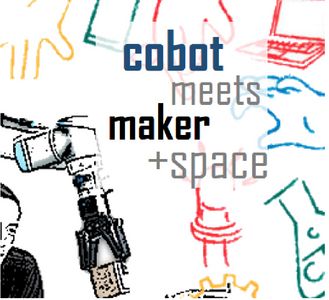CoMeMak: Cobots in Makerspace
Democratization of collaborative robot technology in public workshops
Despite the great potential and increasing sales of collaborative robots (Cobots), they are only used in a very limited number of industrial applications. The reasons for this are the high safety requirements, the comparatively slow movements of the robots in fenceless and collaborative operation and the corresponding limits of an economic use. In addition, there is a lack of intuitively usable tools for robot programming as well as documented and useful best practice applications that can be easily transferred and used in industrial environments. Against this background, this project focuses on Austrian Makerspaces and FabLabs. These are collaborative workshops in which people without any relevant training (the so-called "makers") are granted access to industrial machines free of charge or for a fee. These workshops offer basic training to interested persons, who can then use the Cobot without supervision. With the emergence of the format of the Makerspaces, a protected space for creative technical task and solution finding exists for a broad interested audience of non-experts.
By introducing the Cobot technology into an Austrian Makerspace, the project addresses a number of problems in the field of intuitive robot programming, robot safety, and the acquisition of knowledge from the use of Cobots by interested laymen. The creative energy of the makers and the environment of the Makerspaces allows to completely rethink the tool Cobot and to reinvent its application possibilities. This starts with the way of programming, goes on to the way of designing the human-robot cooperation and ends with the combination with other tools and machines. The planned project results include a new web-based intuitive programming and simulation environment for Cobots, which will be further developed and improved by the maker community, and an online knowledge base with use cases and design patterns for human-robot interaction in production. The transfer of these results to industry is aimed at, for example, by evaluating them in the training center of an Austrian engine manufacturer and by establishing contacts to other manufacturing companies.


